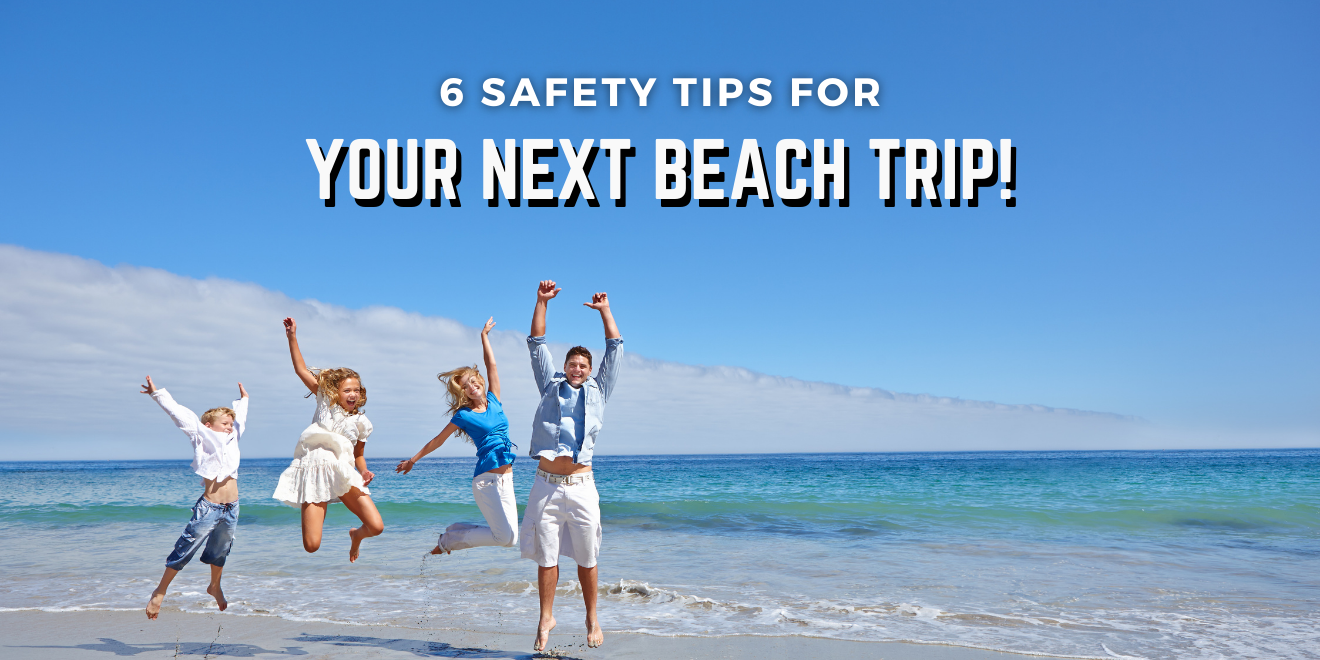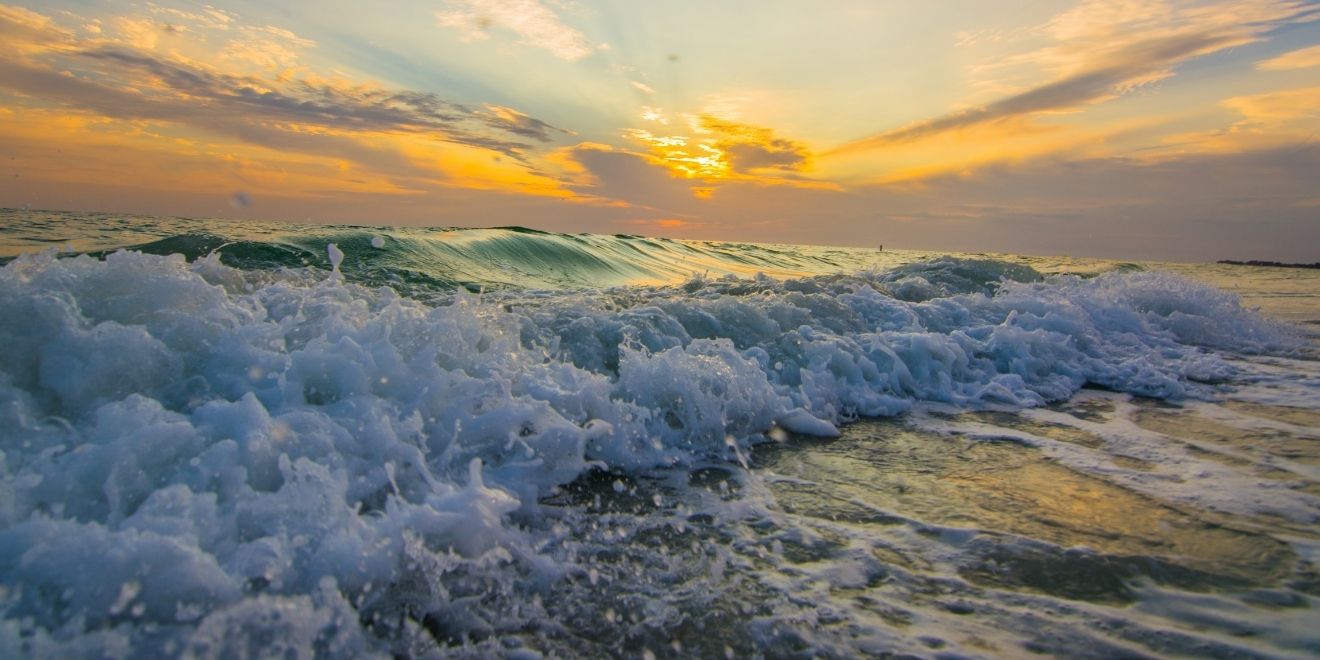6 Safety Tips for Your Next Beach Trip

Vacation time with the family often means packing up the car and heading to the beach. While there are few more enjoyable ways to spend the day, frolicking in the waves, the beach can hold hidden dangers for you and your family. Before you hit the sand and surf, it’s important that you know how to stay safe.
Nothing ruins a day at the beach faster than facing an emergency. The last thing you want to do is call a personal injury attorney after your day on the shore. To keep everyone safe and happy in the sunshine and waves, it’s important to know the hidden dangers that lay above and beneath the sand.
From wearing the right sunscreen to protecting your feet on the sand, there are many safety issues to consider when you visit the beach. Let’s take a closer look at a few safety tips for your next beach vacation.

A sunburn can ruin your whole vacation, which is why it’s important to protect your skin when you are enjoying the sun and sand. Make sure that the whole family is slathered in waterproof sunscreen at the beginning of your day. Even waterproof products eventually wear off so it’s important to reapply your sunscreen a few times during the day. For a full day in the sun, sunscreen with a minimum of SPF 50 is recommended.
Spending the day in the sun exposes your body to a lot of sunshine. Sunscreens can go beyond what is found in the bottle. Make sure that your beach gear includes some sort of sun protection like a sun tent or umbrella. You should also guard your skin and head against too much sun. Take a wide-brimmed hat for lounging on the beach and a light fabric coverup for the best protection.
You may be surrounded by water at the beach, but it’s important to keep your body full of water too. When packing for your beach trip, always make sure that you bring enough for everybody to drink. Water or energy drinks are the best choices. Try to avoid alcohol , as it can make you more dehydrated.
Signs of dehydration include dizziness, fainting, vomiting, headache, and confusion. If you or someone in your party starts to feel unwell, it could be due to dehydration. Have them sit in a shaded area and drink water slowly. Do not give them too much water at one time. If the symptoms do not stop after a one-half hour, you may want to visit the emergency room to get the right fluids.

When you head to the beach, it’s important to have the right footwear. You may love the feel of the sand between your toes, but there are many ways that the beach can hurt your feet. A pair of water shoes with a solid sole can protect you from bits of sharp debris and garbage on the shore and unseen rocks and sharp shells beneath the waves.
An emergency can happen in just minutes at the beach. Before you head out, check the local beach websites to see if lifeguards patrol the area. Parents always make the safety of their children a priority, however, with all the activity on a public beach, it’s possible to lose sight of your children. All it takes is a single moment for your child to get into trouble in the water.
You may want to limit your beach visits to those that have added lifeguard services.
In certain areas, you may have to worry about beach security. In city areas like Los Angeles or Rio De Janeiro, you may be visiting beaches that have a high level of traffic. You could be at risk for theft or even muggings. You may want to check ahead of your trip to the beach to find out what locations have regular police patrols.
While it may be thrilling to encounter a sea turtle or seal at the beach, giving all the water wildlife enough room to breathe is important. Never approach a marine animal or try to feed them. Do not try to swim alongside any marine life. They may feel threatened and try to attack. Remember that you are in their environment and that, while it is exciting to see certain wildlife, it is always best to leave them in peace and keep your distance.

One of the most common beach injuries is stings from jellyfish. These translucent creators can be very difficult to see in and out of the water. Jellyfish can be swept ashore during the change of the tides and can create a hazard on the beach. A jellyfish that is beached may be hard to spot. Look for a roundish blob that is clear or milky white. If you find a jellyfish on the beach, leave it be and don’t try to move it back into the water. If you are in an ocean area, look for purple or blue flags in the water that will tell you if there are jellyfish in the area. If you are stung by a jellyfish, seek medical help immediately.
The currents of the ocean can be incredibly strong. Visit the beach website to get the current surf and tide warnings data. If the riptides are strong, it’s best to stay closer to the beach. If you are ever caught in a riptide , swim as hard as you can in a line that is parallel to the beach until you are out of the current.

Riptides can happen very close to shore. You can be quickly dragged out into deeper waters when you are caught in a riptide. If you have children swimming with you at the beach, they can be especially prone to the strength of a riptide. You should make a rule that your child does not go out into the water past their waist to help keep them safe in strong tidal waters.
A day at the beach is a wonderful opportunity to spend quality time with your family and friends. Follow these tips to help you stay safe during your beach vacation.
Nothing ruins a day at the beach faster than facing an emergency. The last thing you want to do is call a personal injury attorney after your day on the shore. To keep everyone safe and happy in the sunshine and waves, it’s important to know the hidden dangers that lay above and beneath the sand.
From wearing the right sunscreen to protecting your feet on the sand, there are many safety issues to consider when you visit the beach. Let’s take a closer look at a few safety tips for your next beach vacation.

Sunscreen
A sunburn can ruin your whole vacation, which is why it’s important to protect your skin when you are enjoying the sun and sand. Make sure that the whole family is slathered in waterproof sunscreen at the beginning of your day. Even waterproof products eventually wear off so it’s important to reapply your sunscreen a few times during the day. For a full day in the sun, sunscreen with a minimum of SPF 50 is recommended.
Spending the day in the sun exposes your body to a lot of sunshine. Sunscreens can go beyond what is found in the bottle. Make sure that your beach gear includes some sort of sun protection like a sun tent or umbrella. You should also guard your skin and head against too much sun. Take a wide-brimmed hat for lounging on the beach and a light fabric coverup for the best protection.
Hydrate
You may be surrounded by water at the beach, but it’s important to keep your body full of water too. When packing for your beach trip, always make sure that you bring enough for everybody to drink. Water or energy drinks are the best choices. Try to avoid alcohol , as it can make you more dehydrated.
Signs of dehydration include dizziness, fainting, vomiting, headache, and confusion. If you or someone in your party starts to feel unwell, it could be due to dehydration. Have them sit in a shaded area and drink water slowly. Do not give them too much water at one time. If the symptoms do not stop after a one-half hour, you may want to visit the emergency room to get the right fluids.

Foot Protection
When you head to the beach, it’s important to have the right footwear. You may love the feel of the sand between your toes, but there are many ways that the beach can hurt your feet. A pair of water shoes with a solid sole can protect you from bits of sharp debris and garbage on the shore and unseen rocks and sharp shells beneath the waves.
Beach Security
An emergency can happen in just minutes at the beach. Before you head out, check the local beach websites to see if lifeguards patrol the area. Parents always make the safety of their children a priority, however, with all the activity on a public beach, it’s possible to lose sight of your children. All it takes is a single moment for your child to get into trouble in the water.
You may want to limit your beach visits to those that have added lifeguard services.
In certain areas, you may have to worry about beach security. In city areas like Los Angeles or Rio De Janeiro, you may be visiting beaches that have a high level of traffic. You could be at risk for theft or even muggings. You may want to check ahead of your trip to the beach to find out what locations have regular police patrols.
Wildlife
While it may be thrilling to encounter a sea turtle or seal at the beach, giving all the water wildlife enough room to breathe is important. Never approach a marine animal or try to feed them. Do not try to swim alongside any marine life. They may feel threatened and try to attack. Remember that you are in their environment and that, while it is exciting to see certain wildlife, it is always best to leave them in peace and keep your distance.

One of the most common beach injuries is stings from jellyfish. These translucent creators can be very difficult to see in and out of the water. Jellyfish can be swept ashore during the change of the tides and can create a hazard on the beach. A jellyfish that is beached may be hard to spot. Look for a roundish blob that is clear or milky white. If you find a jellyfish on the beach, leave it be and don’t try to move it back into the water. If you are in an ocean area, look for purple or blue flags in the water that will tell you if there are jellyfish in the area. If you are stung by a jellyfish, seek medical help immediately.
Riptides
The currents of the ocean can be incredibly strong. Visit the beach website to get the current surf and tide warnings data. If the riptides are strong, it’s best to stay closer to the beach. If you are ever caught in a riptide , swim as hard as you can in a line that is parallel to the beach until you are out of the current.

Riptides can happen very close to shore. You can be quickly dragged out into deeper waters when you are caught in a riptide. If you have children swimming with you at the beach, they can be especially prone to the strength of a riptide. You should make a rule that your child does not go out into the water past their waist to help keep them safe in strong tidal waters.
A day at the beach is a wonderful opportunity to spend quality time with your family and friends. Follow these tips to help you stay safe during your beach vacation.




































































































